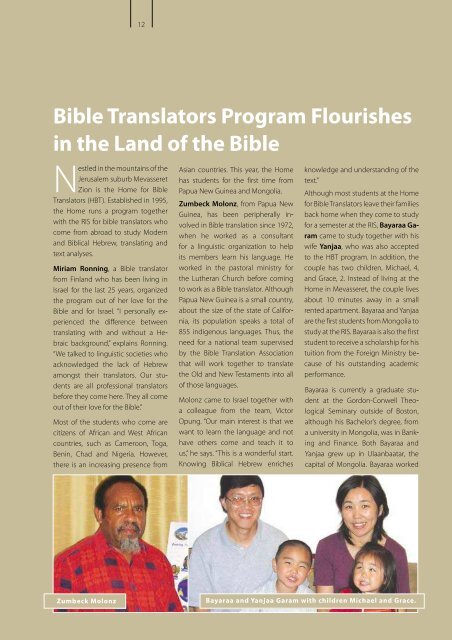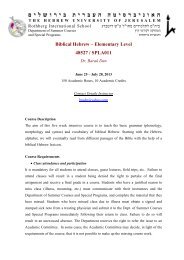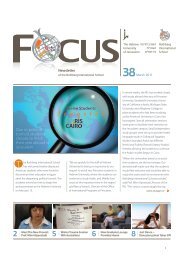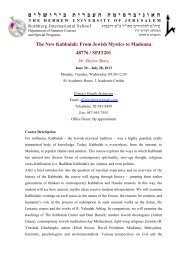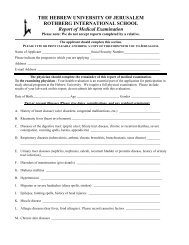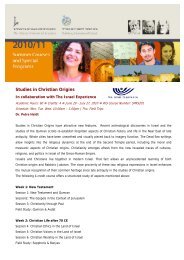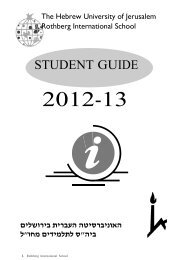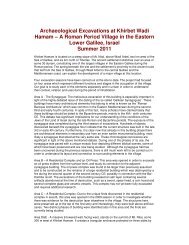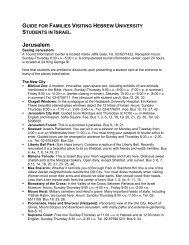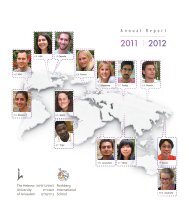Create successful ePaper yourself
Turn your PDF publications into a flip-book with our unique Google optimized e-Paper software.
12<br />
FOCUS 32 13<br />
Bible Translators Program Flourishes<br />
in the Land of the Bible<br />
Nestled in the mountains of the<br />
Jerusalem suburb Mevasseret<br />
Zion is the Home for Bible<br />
Translators (HBT). Established in 1995,<br />
the Home runs a program together<br />
with the RIS for bible translators who<br />
come from abroad to study Modern<br />
and Biblical Hebrew, translating and<br />
text analyses.<br />
Miriam Ronning, a Bible translator<br />
from Finland who has been living in<br />
Israel for the last 25 years, organized<br />
the program out of her love for the<br />
Bible and for Israel. “I personally exp<br />
perienced the difference between<br />
translating with and without a Hebp<br />
braic background,” explains Ronning.<br />
“We talked to linguistic societies who<br />
acknowledged the lack of Hebrew<br />
amongst their translators. Our studp<br />
dents are all professional translators<br />
before they come here. They all come<br />
out of their love for the Bible.”<br />
Most of the students who come are<br />
citizens of African and West African<br />
countries, such as Cameroon, Toga,<br />
Benin, Chad and Nigeria. However,<br />
there is an increasing presence from<br />
Zumbeck Molonz<br />
Asian countries. This year, the Home<br />
has students for the first time from<br />
Papua New Guinea and Mongolia.<br />
Zumbeck Molonz, from Papua New<br />
Guinea, has been peripherally invp<br />
volved in Bible translation since 1972,<br />
when he worked as a consultant<br />
for a linguistic organization to help<br />
its members learn his language. He<br />
worked in the pastoral ministry for<br />
the Lutheran Church before coming<br />
to work as a Bible translator. Although<br />
Papua New Guinea is a small country,<br />
about the size of the state of Californp<br />
nia, its population speaks a total of<br />
855 indigenous languages. Thus, the<br />
need for a national team supervised<br />
by the Bible Translation Association<br />
that will work together to translate<br />
the Old and New Testaments into all<br />
of those languages.<br />
Molonz came to Israel together with<br />
a colleague from the team, Victor<br />
Opung. “Our main interest is that we<br />
want to learn the language and not<br />
have others come and teach it to<br />
us,” he says. “This is a wonderful start.<br />
Knowing Biblical Hebrew enriches<br />
knowledge and understanding of the<br />
text.”<br />
Although most students at the Home<br />
for Bible Translators leave their families<br />
back home when they come to study<br />
for a semester at the RIS, Bayaraa Gar<br />
ram came to study together with his<br />
wife Yanjaa, who was also accepted<br />
to the HBT program. In addition, the<br />
couple has two children, Michael, 4,<br />
and Grace, 2. Instead of living at the<br />
Home in Mevasseret, the couple lives<br />
about 10 minutes away in a small<br />
rented apartment. Bayaraa and Yanjaa<br />
are the first students from Mongolia to<br />
study at the RIS. Bayaraa is also the first<br />
student to receive a scholarship for his<br />
tuition from the Foreign Ministry becp<br />
cause of his outstanding academic<br />
performance.<br />
Bayaraa is currently a graduate studp<br />
dent at the Gordon-Conwell Theolp<br />
logical Seminary outside of Boston,<br />
although his Bachelor’s degree, from<br />
a university in Mongolia, was in Bankip<br />
ing and Finance. Both Bayaraa and<br />
Yanjaa grew up in Ulaanbaatar, the<br />
capital of Mongolia. Bayaraa worked<br />
Bayaraa and Yanjaa Garam with children Michael and Grace.<br />
as a finance manager for six years<br />
and was simultaneously involved<br />
with the Christian Ministry. All along,<br />
he was extremely interested in how<br />
the Bible [Old and New Testaments]<br />
came to be translated into Mongolp<br />
lian and wanted to try to access the<br />
original texts. However, he knew neitp<br />
ther Hebrew nor Greek and was thus<br />
limited to English translations. Before<br />
commencing his graduate studies,<br />
Bayaraa worked as a project manager,<br />
overseeing the translation of a Bible<br />
dictionary into Mongolian. The projep<br />
ect took two years and the end result<br />
was 900 pages. He also worked as a<br />
translator in different fields, including<br />
economics and finance, as well as<br />
Bible related material. Only after accp<br />
cruing a significant amount of translp<br />
lating experience did he embark on<br />
graduate studies in the United States.<br />
“My vision is to translate both Bibles<br />
into Mongolian from their original<br />
languages,” he says. “There is a need<br />
to reflect the original Bible as closely<br />
as possible.”<br />
Yanjaa studied in a teacher training<br />
college to become an elementary<br />
school teacher and she also received<br />
her B.A. in Business Administration.<br />
However, she too left her original<br />
field of study and began working as a<br />
Mongolian language tutor and Englp<br />
lish language translator for five years<br />
for Christian missions in Mongolia.<br />
She then worked as a project manap<br />
ager for World Vision, a humanitarian<br />
Christian organization, which helps<br />
to improve the condition of children<br />
in developing countries. While her<br />
(cont. on page 16)<br />
Nativ directors, past and present, pose at the 25th anniversary gala dinner. From left to right:<br />
RIS Vice Provost Shimon Lipsky Nativ 1-8<br />
David Keren Nativ 9-24<br />
Yossi Garr Nativ 25<br />
Newsletter of the<br />
T he Nativ College Leadership Program <strong>Rothberg</strong> in Israel, <strong>International</strong> a joint venture <strong>School</strong> of the<br />
Hebrew University and the United Synagogue of Conservative Judaip<br />
ism, celebrated its 25th anniversary at a gala happening in the Shalp<br />
lom Jerusalem Hotel in early January. Over 230 people were in attendance,<br />
including alumni and current students.<br />
RIS Vice Provost Shimon Lipsky was the first director of the Nativ program<br />
and has been involved in all aspects of the program. He helped to create<br />
the program and served as its director for eight years. When he first came<br />
to work at the RIS, he supervised Nativ’s academic program. “The success<br />
of the program has been overwhelming,” asserts Lipsky. “It has served as a<br />
model for programs of a similar nature that combine leadership training and<br />
academic studies.”<br />
Nativ’s popularity has been growing in recent years. This year, a record numbp<br />
ber of 64 students studied at the RIS, and David Keren, the director of USY<br />
programs in Israel, expects that number to increase next year. “I think there<br />
has been a change in the mindset in the USY movement. People are beginnp<br />
ning to understand that spending a year in Israel before college is a valuable<br />
option,” Keren explains. “Of course, as the program becomes more popular,<br />
word of mouth helps, and so does the quality of the program.”<br />
Nativ students spend an exclusive mini-semester and autumn semester at<br />
the RIS. They live at Beit Nativ, in Jerusalem's center, and participate in culturap<br />
al and social activities within the Nativ Institute. During the spring semester,<br />
participants choose between living on a kibbutz and community service.


